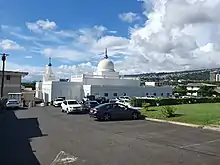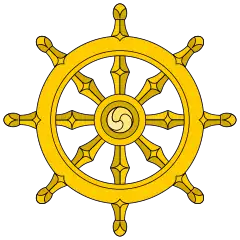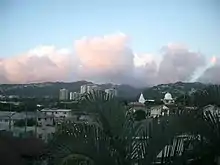Honpa Hongwanji Mission of Hawaii
The Honpa Hongwanji Mission of Hawaii is a district of the Nishi (West) Hongwanji branch of Jodo Shinshu Buddhism, a school of Mahayana Pure Land Buddhism.

History
Jodo Shinshu Buddhism was established in Hawaii as a result of the immigration of Japanese people to work the sugarcane plantations in Hawaii. The first Hongwanji temple in the Hawaiian islands was dedicated on March 3, 1889.[1] In 1897, the Nishi Hongwanji in Kyoto, Japan began sending official ministers to establish temples for Japanese immigrants in Hawaii and the mainland United States.[2] The first was Kenjun Miyamoto, who laid the groundwork for the ministry. Honi Satomi was the first priest, serving from 1898 until 1900, when he returned to Japan. Yemyo Imamura took over for Satomi in 1900, and served until his death in 1932.[3][4]
Since these early days, 36 temples have been established across the Hawaiian Islands, including the Honpa Hongwanji Hawaii Betsuin and the Honpa Hongwanji Hilo Betsuin. The mission operates the Hongwanji Mission School and Pacific Buddhist Academy.[5] It is administered separately from the Buddhist Churches of America, the umbrella organization of Jodo Shinshu temples in the continental United States.[6]
In 1976, insurance executive Paul Yamanaka went to Yoshiaki Fujitani, Bishop of the Mission, with the idea to create a program called "Living Treasures of Hawai'i" modeled after the Living National Treasures program of Japan.[7] The purpose of the award is to recognize and honor persons who have demonstrated excellence and high standards of achievement in their particular fields of endeavor and have made significant contributions to humanity toward a more fraternal society.[8] Any person can nominate an individual for the award. This program has honored more than 100 community members to date.
Locations
| Part of a series on |
| Buddhism |
|---|
 |
|
Headquarters of the Honpa Hongwanji Mission of Hawaii are located in Honolulu. The following is a list of the organization's affiliated temples.

- Honpa Hongwanji Hawaii Betsuin, Honolulu
- Honpa Hongwanji Hilo Betsuin, Hilo
- Pacific Buddhist Academy, Honolulu
- Hongwanji Mission School, Honolulu
- Buddhist Study Center, Honolulu
Oahu
- Aiea Hongwanji Mission, Aiea
- Ewa Hongwanji Mission, Ewa
- Jikoen Hongwanji Mission, Honolulu
- Windward Buddhist Temple (Kailua Hongwanji Mission), Kailua
- Mililani Hongwanji Mission, Mililani
- Moiliili Hongwanji Mission, Honolulu
- Pearl City Hongwanji Mission, Pearl City
- Wahiawa Hongwanji Mission, Wahiawa
- Waialua Hongwanji Mission, Waialua
- Waianae Hongwanji Mission, Waianae
- Waipahu Hongwanji Mission, Waipahu
Hawaii (Big Island)
- Honohina Hongwanji Mission, Ninole
- Honokaa Hongwanji Mission, Honokaa
- Honomu Hongwanji Mission, Honomu
- Kamuela Hongwanji Mission, Kamuela
- Kohala Hongwanji Mission, Kapaau
- Kona Hongwanji Mission, Kealakekua
- Naalehu Hongwanji Mission, Naalehu
- Paauilo Hongwanji Mission, Paauilo
- Pahala Hongwanji Mission, Pahala
- Papaaloa Hongwanji Mission, Papaaloa
- Papaikou Hongwanji Mission, Papaikou
- Puna Hongwanji Mission, Keaau
Maui
- Kahului Hongwanji Mission, Kahului
- Lahaina Hongwanji Mission, Lahaina
- Makawao Hongwanji Mission, Makawao
- Wailuku Hongwanji Mission, Wailuku
- Lanai Hongwanji Mission, Lanai City
Kauai
- Hanapepe Hongwanji Mission, Hanapepe
- Kapaa Hongwanji Mission, Kapaa
- Lihue Hongwanji Mission, Lihue
- Waimea Hongwanji Mission, Waimea
See also
- Buddhist Churches of America
- Jodo Shinshu Buddhist Temples of Canada
- South America Hongwanji Mission
- Byodo-In Temple (non-denominational), Kaneohe
- Broken Ridge Buddhist Temple (Korean Buddhism), Honolulu
- Daifukuji Soto Zen Mission (Zen Buddhism), Honalo
- Hawaii Shingon Mission (Shingon Buddhism), Hilo
- Hsu Yun Temple (Chinese Buddhism), Honolulu
- Koyasan Shingon Mission of Hawaii (Shingon Buddhism), Hilo
References
- "Who we are". Honpa Hongwanji Mission of Hawaiʻi web site. 2005. Retrieved 2010-04-20.
- "History of the Hongwanji: Beyond National Boundaries". Main Jodo Shinshu Buddhist organization in Japan. 2002. Archived from the original on 2013-04-04. Retrieved 2009-09-29.
- Kimura, Yukiko (1992). Issei : Japanese immigrants in Hawaii (Pbk. ed.). Honolulu: University of Hawaii Press. ISBN 0824814819. OCLC 37566798.
- Ogawa, Dennis; Grant, Glen (1980). Kodomo no tame ni = For the sake of the children : the Japanese American experience in Hawaii. Honolulu: University Press of Hawaii. ISBN 0824807308. OCLC 7865082.
- "A legacy of hope: A retiring bishop hopes a Buddhist high school can rejuvenate an aging sect". Honolulu Star-Bulletin. February 3, 2007. Retrieved 2010-04-20.
- "Honpa Hongwanji Hawaii Betsuin". official web site. 2005. Retrieved 2010-04-20.
- "Honpa Hongwanji Mission to honor Living Treasures of Hawaii". Honolulu Star-Bulletin. February 1, 2003. Retrieved 2010-04-20.
- Scott Stone (2000), Living Treasures of Hawaii 25th Anniversary of the Selections of Outstanding Persons as Honored by the Honpa Hongwanji Mission of Hawaii, Honolulu: Honpa Hongwanji Mission of Hawaii, ISBN 0-89610-316-1
External links
- "Honpa Hongwanji Mission of Hawaiʻi". official web site. 2005. Retrieved 2010-04-20.
- Zenaida Serrano (August 30, 2009). "Honor & ambition". Honolulu Advertiser. Retrieved 2010-04-20.